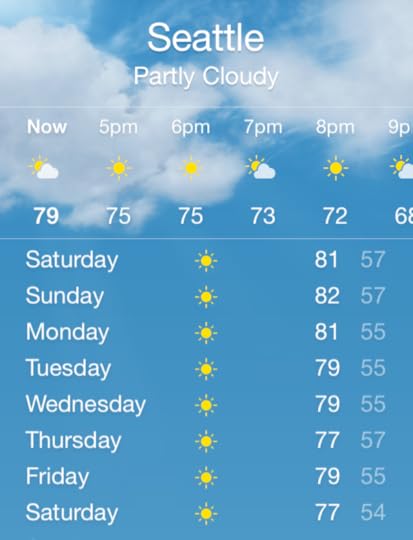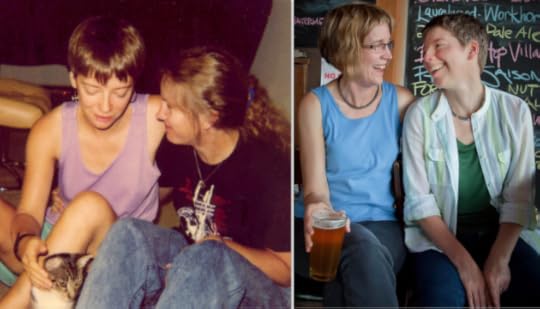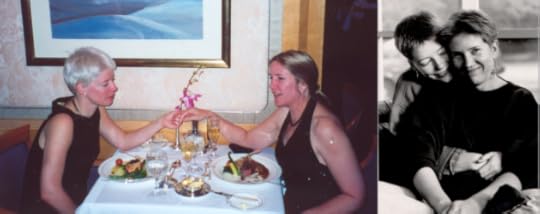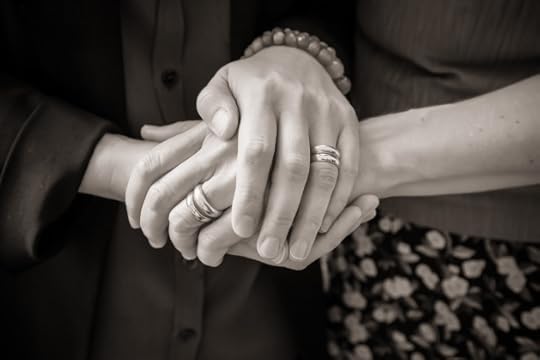Nicola Griffith's Blog, page 72
July 8, 2015
Readercon readings
I’ll be reading twice at Readercon. Both times on Friday 11.
The first reading is a solo event, where I’ll be reading a chunk from the beginning of Menewood, that is, Hild II (but not the opening pages—see below), plus my Tiptree essay. Both are brand new and never-before heard: 2 pm, Empower, Friday 11.
The second is a group reading, featuring members of the Outer Alliance, an organisation dedicated to QUILTBAG speculative fiction: me, Kelley, Sarah Pinsker, Malinda Lo, Claire Humphrey, Brad Parks, Susan Jane Bigelow, and Jill Shultz. I don’t know what anyone plans to read except me and Kelley—her reading absolutely rocks; it will make you weep (made me cry, anyway). I’ll be reading the opening pages of Menewood. The other writers have written great stuff so I know their readings will be fabulous. Do come and listen, it’ll be a treat: 7 pm, Inspire, Friday 11.
My full schedule (and it is full) is here.








July 6, 2015
For those attuned to theremins
I write for those who, when—in real life, or a book, or a song—they touch something that makes them shiver, don’t turn and run, but turn and follow. For those who aren’t afraid of what they don’t know. Those who love to discover something new, something different.
I write for those who live for the build and vertiginous drop, that rush of reversal, the knowledge that It’s about to happen: the secret be revealed, the aliens land, the theory unfurl. I write for those who actively seek awe. Whether a flint in the moss or a moth you’ve never seen, the turn of a verb or toss of a delicious head—it thrills you to your marrow, it gives you a frisson. You hear the theremin in your head.
I write for those attuned to theremins.








For those attuned to theramins
I write for those who, when—in real life, or a book, or a song—they touch something that makes them shiver, don’t turn and run, but turn and follow. For those who aren’t afraid of what they don’t know. Those who love to discover something new, something different.
I write for those who live for the build and vertiginous drop, that rush of reversal, the knowledge that It’s about to happen: the secret be revealed, the aliens land, the theory unfurl. I write for those who actively seek awe. Whether a flint in the moss or a moth you’ve never seen, the turn of a verb or toss of a delicious head—it thrills you to your marrow, it gives you a frisson. You hear the theramin in your head.
I write for those attuned to theramins.








July 3, 2015
Less jaw-jaw, more chainsaw
I just like the phrase. It could be a movie line. A commentary on the current situation in Greece. An aside heard at any business meeting.
Thoughts?








June 30, 2015
My Readercon schedule
Note: I’ve added one thing already*. There may be more additions to come.
I’m Guest of Honour, with the fabulous Gary K. Wolfe, at this year’s Readercon Thursday July 9 – Sunday July 12 in Burlington, MA. Joanna Russ is the Memorial GoH.
Here’s my schedule, mostly panels but also a reading, signing, kaffeeklatsch, party, and staged interview. I’ve included Kelley’s events (K) because I’ll be at most of them.
Thursday July 9
8:00 PM The Long Slow Burn of Critique
Friday July 10
2:00 PM Reading: Nicola Griffith
3:00 PM The Genre-Sized Chip on the Shoulder
5:00 PM The Works of Nicola Griffith – K
7:00 PM Outer Alliance group reading*
10:30 PM Meet the Pros(e)
11:30 PM Eighties Dance Party! (time is my guesstimate)
Saturday July 11
9:00 AM Kaffeeklatsch
11:00 AM Autographs
12:00 PM “Bad” Influences – K
2:00 PM What Joanna Russ’s Work Meant to Me
3:00 PM Beautiful and Terrible as the Morn: Celebrating Spec Fic’s Older Women – K
4:00 PM Nicola Griffith Interviewed by Kelley Eskridge
Sunday July 12
10:00 AM Reading Stance and Genre
11:00 AM The Shirley Jackson Awards
1:00 PM The OtherLife of Solitaire – K
So come and say hello. When I’m not on a panel, or reading, or signing things, I’ll most likely be in the bar. Also, for the first time at Readercon, there’s an eighties dance party, right after Meet the Pros(e) thing. But whenever it is, Kelley will be dancing her socks off. Actually, I suspect she won’t be wearing socks…
But if you can only make three events, come to:
My reading, where you can hear the first part of Hild II, aka Menewood, and a short essay about Alice Sheldon/James Tiptree, Jr.
The staged interview, in which Kelley will be asking me questions—which I don’t know beforehand, so expect some surprises (I certainly will).
Kelley’s talk about the book-to-screen process of her novel, Solitaire. Trust me, you really don’t want to miss it. She’s been working on the screen adaptation of her novel for a while, and it’s about to come to fruition…
If you haven’t signed up yet, you can do that here. ($75 for the weekend, or one-day rates.)








June 27, 2015
Marriage equality will change the world
Right now I have too many thoughts and feelings, coming too thick and fast, to write a thoughtful piece about the US Supreme Court’s opinion that the 14th Amendment requires states to allow couples of the same sex to marry. I am so very glad—particularly for those at the start of their journey. Falling in love or lust with someone with the same bits as you is now unremarkable.
Until I can wrap my head around the enormity of it all, here’s an edited repost of something I wrote a couple of years ago.
The Personal Consequences of Growing Up Queer
Most people who meet me think I’m lucky to have escaped the prejudice of the world. I don’t look damaged. I don’t look like a victim. I don’t behave—or write—that way.
But every year or two I wonder: who would I be, how might my life have turned out, if I hadn’t grown up facing a strong wind and having to walk uphill?
Some years ago I had a conversation with a friend (she is still a friend; she will remain nameless) who thought that prejudice was a thing of the distant past, something for the history books that maybe only happened to a vague and shadowy group of Disadvantaged. I told her that, no, it happened a lot. It happened to me. She just couldn’t accept it: I don’t look or behave like a victim. I’m not a victim, I said. She asked me some questions.
This is a paraphrased transcript of our conversation.
Well, have you ever been physically injured because you’re queer?
Yes. I was beaten by several men in a club and ended up in the emergency room with a broken nose, concussion, etc. Also, three men tried to burn the house down, and rape me to show me what I was missing. Oh, and someone threw a brick through my window (I got out of bed and cut my feet to ribbons). And two men shotgunned the bedroom window of the flat I’d just moved out of. And, well, the list, frankly, is almost endless. (If I wanted to take the time, I could probably come up with more than a hundred incidents.)
Have you ever been denied education for being queer?
Yes. I had to give up my degree course because my parents wouldn’t fund their part of the cost (this was in the UK before there were such things as student loans). “Why bother?” my mother said. “No one will give a lesbian a job, anyway.” And the fact is, no one would give me a job.
Have you ever been denied benefits for being queer?
Yes. I had to fight for five years to be able to get my Green Card. It cost somewhere between $15,000 and $20,000 (at a time when, between us, Kelley and I were earning less than $30,000 a year; we maxed out three credit cards). My case made new law. It took years to get free of the psychological stress (I had nightmares) and the burden of debt. If we had been legally married it would have been smooth and automatic and virtually free. In addition, I couldn’t get health insurance on Kelley’s employee ticket; this was before domestic partnership provisions. We were monumentally broke. I couldn’t get a job. I was sick. I had no health insurance. All because I’m queer.
Have you been been denied access to healthcare for being queer?
Yes. A gynecologist once tried to refuse me a Pap smear. Another refused to discuss reproductive issues. Also, once in a very scary health situation, Kelley was told she would have no say should anything go wrong. Fortunately, we could leave. We did. (Again, I could make a list.)
There were many other questions with the same basic thrust: Did I really have a hard time? And all my answers were the same: Yes, I really did; I have been harmed physically, mentally, emotionally, legally, financially.
I don’t generally dwell on this. I choose—willfully, daily—to focus my energies on moving forward, on staying open, on interacting with the world as humanly as possible. I’ve seen what it does to those who get bitter and wary and overly defended. They retreat further and further from the mainstream. They become even more Othered. I honour activists who live in the war zone, and I understand those who retreat behind their fortress walls, but that’s not my path. My choice is to remain as undefended as possible, to share—in person and through my work—how it feels to be me, to help others understand and empathise. To be human not Other.
Perhaps because so many of us have somehow managed to weather this tide of prejudice without visible damage it’s easy for some to believe We’re All Equal Now. We’re not. Yes, as a class queers are becoming more politically significant. But those who argue (go listen again to the Supreme Court arguments about same-sex marriage) that we don’t need to dismantle prejudicial legislation right now are wrong. Individuals can and do still have a very hard time. Anti-queer prejudice is real. The legal and therefore social issues involved in the fight for marriage equality go far beyond being able to have a fabulous wedding.
Anti-queer prejudice in most parts of the US and UK is less than it was, certainly. But many of us over a certain age carry scars that influence our interaction with the world. I am smart. I love my work. I have a partner I trust with my life and heart. I have a home. I have a community (I have several interconnected communities). I have a vocation. I have friends and family. In most ways I am lucky. I have a magnificent life. And still, sometimes, every few years, I wonder how it might have been. I wonder how the world will change when we have marriage equality and its concomitant rights. A change in the law will lead to even faster and deeper change in the culture. It will make life easier, safer, richer (literally and metaphorically). It might help some of us let down the barriers, just a little. And then, oh, the world will need to get ready. There will be such a flowering of human art and joy and innovation…








June 26, 2015
27 years
Today is the 27th anniversary of the day I met and fell in love with Kelley at the Clarion Writers’ Workshop.
You’ve probably seen this photo before. I posted it the day the Supreme Court struck down DOMA—which just happened to be our 25th anniversary. (Thanks, SCOTUS! Best present ever.) The one on the left was a Polaroid taken in 1989, by Kelley’s mum I think. The other is by Jennifer Durham, taken in May 2013 in a pub in Seattle.
This next you may not have seen, particularly the one on the left. That was taken in 2000 aboard the QE2 during the transatlantic voyage we gave ourselves for our 40th birthdays. Some of those sparkles (on Kelley—her arm and her dress) are actually sparkles; some (on me, sigh) are just bits of dust on the scanned print. The other photo is by our friend Mark Tiedemann, taken in our house in Atlanta in 1992.
And finally here’s the shot taken the day we got legally married, by the inimitable Jennifer Durham.
Now we wait and hope SCOTUS gives us another present…








June 25, 2015
Silence = death | Quotes, an occasional series #5
Years ago I started a series of posts based on quotes. I got distracted (Hild, work for three non-profits, a cratering economy). Now I feel like picking it up again.
Silence = Death – ACT UP
If you see something, say something. — Department of Homeland Security
Speaking out for me used to be a matter of survival. As child I was spat upon in the street1; in my early 20s I had my house set on fire—a poor attempt, thankfully—and my windows smashed; I was beaten and put in hospital; groups of men tried to batter down the door to rape me and my girlfriend; police threw me against walls, harassed me, manhandled me, and illegally detained me. Speaking out, getting my name on the radio and in the paper, was one way to stay alive.
Each degree of difference from Straight White Middle-Class Male is marked by a slight increase in the normal gravity many operate under. I’m a woman, a queer, and a cripple. Also an immigrant with no degree who lived for years in poverty. There have been times when for me that gravity feels crushing.
These day, though, my gravity feels manageable. I am older, legally and happily married, my family loves me. I have wonderful friends, the esteem of those in my profession, and a lovely house in a peaceful neighbourhood. I am not at physical or legal risk. As life got easier, speaking out gradually ceased to be a priority—for a while it came to seem disingenuous and even, occasionally, ungrateful. There were times, too, when it seemed easier to change hearts and minds when those around me believed I was Just Like Them.
But I’m not.
Nor am I careful by nature. Lately I’m finding it takes more energy to keep quiet than to speak out. Seeing something and then saying something can be inconvenient2 but, ah, fuck it, sometimes it feels good.
1 The first time, I was nine. I grew up Catholic. There were pockets of Yorkshire that remembered virulently anti-Catholic sentiment. (Four hundred years can mean nothing in Britain. Sigh.) I was on the street collecting money for a Catholic old-people’s home (that’s what we called it then) and a woman old enough to be grandmother shouted at me and spat right in my face. I was shocked to the core. Then I got cross…
2 When I posted last month about gender bias in book prizes I spent three solid weeks fielding media enquiries from all over the world. That seems to have died down a bit but it took a lot of effort to push the issue out far enough that it caught the current so I wouldn’t have to steer. I’ve done enough steering for a lifetime. As Dr McCoy might say, “Dammit, Jim, I’m a novelist, not an activist!”








June 23, 2015
Tweaking the Russ Pledge
Four years ago I came up with something I called the Russ Pledge, named after Joanna Russ, a simple way of improving the visibility of women’s writing on the shelves and in the media. In light of recent information, I want to amend that pledge slightly to foreground women writing about women.
The Russ Pledge
The single most important thing we (readers, writers, journalists, critics, publishers, editors, etc.) can do to improve the visibility of books by and about women, and to secure that visibility for the future, is talk about them whenever we talk about books. And if we honestly can’t think of books by and about women ‘good enough’ to match those about men then we should wonder aloud (or in print) why that is so. If it’s appropriate (it might not be, always) we should point to the historical bias that consistently reduces the stature of women’s literature; we should point to Joanna Russ’s How to Suppress Women’s Writing, which is still the best book I’ve ever read on the subject. We should take the pledge to make a considerable and consistent effort to mention work by women about women which, consciously or unconsciously, has been suppressed. Call it the Russ Pledge. I like to think she would have approved.








June 6, 2015
Now that’s what I’m talking about!

It looks like a lovely weekend ahead. Things might be a bit quiet around here. I’ll be hanging out in the sun and sipping tea while I drift between reading the latest Paris Review and thinking about Hild. When the sun goes down (or even just starts to slide a little), I’ll swap the tea for beer (or wine, depending), and reading for conversations with my sweetie.
You?














